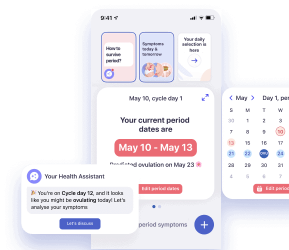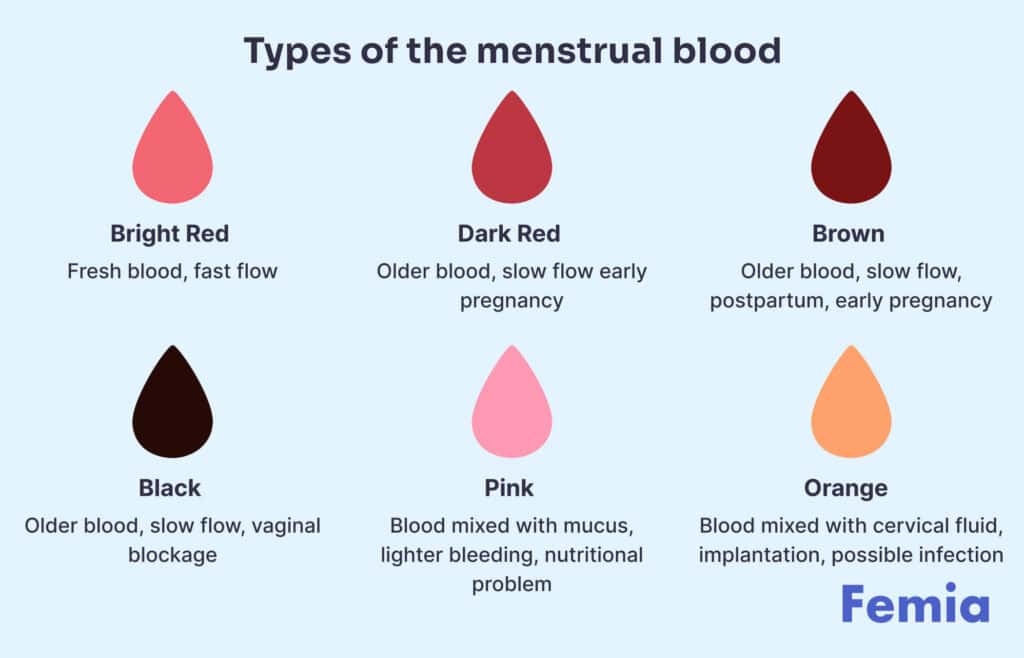Femia > Health Library > Your cycle > Health > Why is my period blood black? Causes, meanings, and when to seek help
Why is my period blood black? Causes, meanings, and when to seek help

- Updated Mar 2, 2025
- Published
CRAFTED BY HUMAN
Crafted by human At Femia, we provide accurate and up-to-date information at every stage of your journey, from trying to conceive, pregnancy and postnatal support. All content is created by a real person based on in-depth research and own professional experience. Femia ensures that you will receive expert advice, strict accuracy and a personalized approach from our authors/medical experts. Learn more about our editorial policy.
FACT CHECKED
Fact checked At Femia Health, we maintain the highest standards of editorial excellence in delivering content focused on helping you conceive, guiding you through pregnancy, and supporting you postpartum. Explore our content review principles to learn how we ensure the accuracy and quality of our health and lifestyle tips for every stage of your journey.
Black period blood is often normal and can occur at the start or end of your period due to slower flow or older blood. Occasionally, it can indicate an underlying health condition, such as infection, fibroids, implantation bleeding, or, rarely, cervical cancer. Reach out to your healthcare provider if you have black discharge along with any other symptoms like pain, unusual odor, fever, large clots, or if you could be pregnant.
Period blood can range in color from light pink to dark brown and can even appear black. Most of the time, these color changes are natural and nothing to worry about, but sometimes they can indicate an underlying health condition.
Experiencing dark brown or black vaginal discharge can come as a shock and might leave you wondering if you need to seek medical advice. This article will guide you through why you might experience dark period blood, when it’s normal, and when you should seek medical advice.

What does black period blood mean?
| Good to know |
|---|
| When talking about ”black period blood,” many women are actually describing period blood that is a very dark brown but appears blackish, like ground coffee beans, rather than a true jet black color. |
Black or very dark brown blood is blood that has been oxidized. Oxidation is a natural process that happens when blood reacts with oxygen in the environment, turning it a darker brown or black color. When it comes to period blood, this generally indicates that it is old blood that has taken longer to leave the uterus.

Very dark period blood is often normal and nothing to worry about, but it can sometimes signal that something else may be going on. Understanding your unique menstrual cycle and what’s normal for you can help you spot any worrying changes and know when to seek medical advice.
Why is my period blood black on the first day?
Seeing black blood on the first day of your period can be a shock, but it’s often completely normal. Black or dark brown period blood often just means that it is older blood that has taken a little bit more time to exit the uterus.
So, why might you have older blood in your uterus? Either the flow of your period is currently slow, giving the blood extra time to be oxidized, which is normal at the start and end of a period, or it is some blood left over from the last period being cleared out in your new cycle. Either way, dark brown or black blood at the start of your period with no other symptoms is not usually something to worry about.
👉Find out more: Egg white discharge: What it means for your cycle and fertility
Black period blood with clots and thickness
Black period blood with clots and a thicker consistency can be unsettling, especially if you’ve never experienced it before. While it is often just a normal variation of your period, there are a few other things to look out for.
Common causes of thick black vaginal discharge with clots include hormonal changes, uterine fibroids, endometriosis, and postpartum lochia.
- Hormonal changes. Hormones help control the flow and consistency of your period, so any shifts in hormones (like around perimenopause, postpartum, or with certain birth controls) can lead to thicker blood and clots.
- Fibroids. These noncancerous growths in the uterus can cause abnormal bleeding and heavier periods with darker, clotted blood. In some cases, treatment may be required, so speak to your healthcare provider if you are concerned about fibroids.
- Endometriosis: This condition can also cause dark blood clots before and during menstruation, as well as severe pain and heavy, irregular menstruation with thicker, darker blood. During menstruation, endometrial tissue that has grown outside the uterus can also bleed, leading to inflammation and a buildup of older, darker blood, which may explain why menstrual blood becomes thick and black.
- Postpartum lochia. It is normal to bleed for 6–8 weeks after giving birth. At the start, the blood can appear dark red to black and contain small clots. Over time, the color should lighten, until it becomes creamy and finally stops altogether. If you have large clots, then talk to your healthcare provider, as you may need some treatment.
When is black period blood normal?
Black or dark brown period blood usually means older blood is leaving your uterus. So, when is this considered normal?
- Start or end of your period. At the beginning and end of your period, your flow tends to be lighter, which means it moves more slowly through your uterus.
- Leftover blood. Sometimes, you may have some leftover blood in your uterus from the last cycle. At the start of your period, your body will clear this out, and because it’s old blood, it can appear black.
- Spotting. Spotting is when there is a small amount of blood leaving the vagina, and it’s common at the start of a period. Due to slow flow rate, it can appear black.
- Slow flow days. When your flow is lighter, the blood moves more slowly through the uterus, giving it more time to oxidize and turn from red to dark brown or blackish.
You can monitor your period using a period-tracking app, like Femia, to note your symptoms.
What other conditions can cause black period blood?
| Condition | Associated symptoms |
|---|---|
| Normal | Can be normal at start/end of period or on slow flow days.
• Your normal premenstrual symptoms |
| Foreign object | If a foreign object, such as a tampon or diaphragm, is left in the vagina, it can irritate the lining and cause an infection.
• Black blood/discharge with unpleasant smell • Pain or itching around vagina • Fever • Difficulty peeing • Pain in lower stomach |
| Fibroids or polyps | Bleeding from uterine fibroids or endometrial polyps can cause black discharge. These are usually non-cancerous growths that occur in the uterus or cervix and are associated with:
• Unusual vaginal bleeding • Bleeding after menopause • Bleeding between periods or after sex • Heavy periods • Pain in lower stomach |
| Sexually transmitted disease (STD) | STDs like chlamydia or gonorrhea can cause dark brown or black discharge along with:
• Foul smelling discharge • Pain when peeing • Pain during sex • Bleeding after sex • Fertility problems |
| Implantation bleeding | This occurs when a fertilized egg implants itself into the uterus wall, causing a small amount of local bleeding. It can appear as dark brown or black spotting, as the blood oxidizes on its way out of the vagina. |
| Miscarriage | Not all bleeding during pregnancy means that something is wrong, but dark spotting can sometimes signify a miscarriage. Other symptoms to watch for include:
• Cramping pain • Heavy bleeding If you’re unsure if your bleeding is a period or a miscarriage, here is a helpful guide. If you’re pregnant and experience any bleeding or unusual discharge, seek urgent medical advice. |
| Postpartum lochia | • Lasts 6–8 weeks • Bleeding can start off dark but gets lighter over time • May contain small clots • May have cramping pain |
| Cervical cancer | Rarely, abnormal bleeding and unusual discharge can be a sign of cervical cancer. Other symptoms include:
• Bleeding after sex—can look black • Bleeding in between periods • Pain during sex Problems peeing • Blood in urine • Watery, pink discharge that may have a foul smell If you have any concerns about cervical cancer, reach out to your healthcare provider. They can start any necessary investigations to ensure your health and peace of mind. |
| Endometriosis | Endometriosis is a chronic condition where endometrial tissue grows outside the uterus, often leading to black, clotted blood during menstruation.
Key symptoms include severe menstrual pain, heavy bleeding with dark clots, chronic pelvic pain, pain during intercourse, and potential fertility issues. If endometriosis is suspected, consult a gynecologist for assessment. |
| Retained period | Also called hematocolpos, this rare condition occurs when period blood can’t escape the vagina and becomes oxidized and black over time.
Usually related to a congenital condition and diagnosed in adolescence or as a complication of cervical surgery. |
👉Find out more: Bruised cervix symptoms: Causes, signs, and when to seek help
When to seek medical advice
While black period blood can be normal, there are also times when it’s a warning sign of something else going on.
Here’s when you should reach out to a healthcare provider:
- You have any other symptoms alongside your black period blood—eg., Foul odor, vaginal pain, cramping in your abdomen/pelvis, generally feeling unwell.
- You are pregnant or think there’s a chance you could be pregnant.
- You have dark blood or discharge outside of your period or after menopause.

Questions from Femia community
Can birth control affect the color of my period blood?
Yes, hormonal birth control can affect how heavy your periods are. If the flow of your period becomes lighter and slower, then the blood can take longer to exit the vagina, giving it more time to be oxidized and appear dark brown or black.
Is black period blood a sign of pregnancy?
Not typically, but black spotting can occur around the time that a fertilized egg attaches itself to the uterus wall. This is called ”implantation bleeding,” although it doesn’t occur in every pregnancy. If you think you might be pregnant and experience any bleeding or unusual discharge, then it’s best to get checked out by a healthcare provider.
Can stress cause black period blood?
Stress can disrupt your hormones and your menstrual cycle. This can potentially lead to spotting or a lighter slower flow, causing period blood that appears black.
The bottom line
Period blood that looks black or very dark brown usually means it’s old blood that has been oxidized. Blood that takes longer to escape the uterus can become oxidized and change color from bright red to dark brown or black.
Black period blood at the start or end of your period or on light flow days is often normal and nothing to worry about. However, it can occasionally indicate an underlying condition. If you have any other unusual symptoms like pain, fever, or difficulty peeing, are pregnant or think you could be, or the dark discharge is happening outside of your expected period time, then reach out to a trusted healthcare provider. They will be able to take a personalized approach to your concerns and advise if any further tests or treatments are needed.
References
- “Abnormal Uterine Bleeding.” ACOG, www.acog.org/womens-health/faqs/abnormal-uterine-bleeding.
- Author, Femia. “Period Vs. Miscarriage: Key Differences and When to Seek Help | Femia.” Femia Health, 20 Aug. 2024, femia.health/health-library/pregnancy/pregnancy-health/period-vs-miscarriage.
- Author, Femia. “Pink Discharge: Causes and What You Can Do About It.” Femia Health, 23 Aug. 2024, femia.health/health-library/your-cycle/health/pink-discharge.
- “Understanding the Menstrual Phase: Everything You Need to Know – Femia.” Femia Health, 8 Oct. 2024, femia.health/health-library/your-cycle/health/menstrual-phase.
- Mohammed, Tibyan Noorallah, et al. “A Rare Cause of Amenorrhea: Hematocolpos in a Post‐cystocele Repair Patient.” Clinical Case Reports, vol. 12, no. 4, Apr. 2024, https://doi.org/10.1002/ccr3.8766.
- “NCI Dictionary of Cancer Terms.” Cancer.gov, www.cancer.gov/publications/dictionaries/cancer-terms/def/oxidation.
- “Premenstrual Syndrome (PMS) – Symptoms and Causes – Mayo Clinic.” Mayo Clinic, 25 Feb. 2022, www.mayoclinic.org/diseases-conditions/premenstrual-syndrome/symptoms-causes/syc-20376780.
- Reed, Beverly G., and Bruce R. Carr. “The Normal Menstrual Cycle and the Control of Ovulation.” Endotext – NCBI Bookshelf, 5 Aug. 2018, www.ncbi.nlm.nih.gov/books/NBK279054/?report=reader.
- “Sexually Transmitted Diseases (STDs) – Symptoms and Causes.” Mayo Clinic, www.mayoclinic.org/diseases-conditions/sexually-transmitted-diseases-stds/symptoms-causes/syc-20351240.
- “Uterine Fibroids – Symptoms and Causes.” Mayo Clinic, www.mayoclinic.org/diseases-conditions/uterine-fibroids/symptoms-causes/syc-20354288.
- “Uterine Polyps – Symptoms and Causes – Mayo Clinic.” Mayo Clinic, 15 Nov. 2022, www.mayoclinic.org/diseases-conditions/uterine-polyps/symptoms-causes/syc-20378709.
- Website, Nhs. “Symptoms.” nhs.uk, 1 Aug. 2024, www.nhs.uk/conditions/miscarriage/symptoms.
- “Your Body After the Birth.” nhs.uk, 23 July 2024, www.nhs.uk/pregnancy/labour-and-birth/after-the-birth/your-body.
- www.uhs.nhs.uk. “Patient Information Factsheet.” Patient Information Factsheet, www.uhs.nhs.uk/Media/UHS-website-2019/Patientinformation/Pregnancyandbirth/Blood-loss-what-to-expect-after-the-birth-of-your-baby-743a-PIL.pdf.

Learn about first-trimester screening tests, including how they’re performed, what they screen for, and what the results can indicate. Understand the process and what to expect during early pregnancy.

How likely are you to get pregnant from precum? Read this in-depth guide to understand the chances of getting pregnant from precum and find actionable tips to mitigate the risks.

Kansas has filed a lawsuit against Pfizer, alleging misinformation about its COVID-19 vaccine’s safety and effectiveness, including during pregnancy. Learn more about the claims, evidence, and implications.

